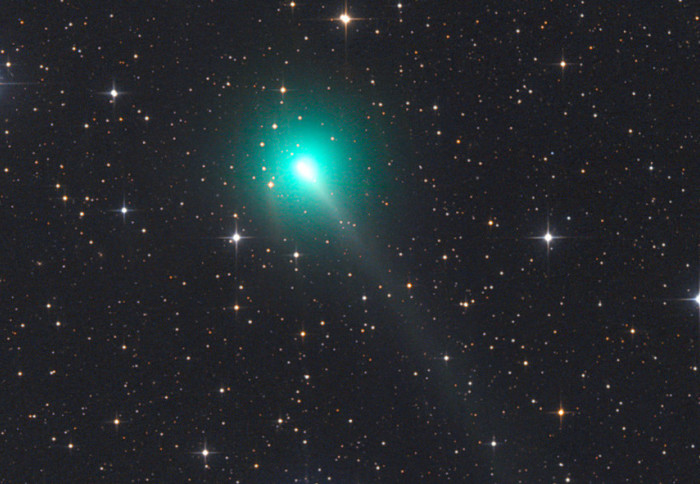Flying through a comet’s tail and fighting fluorine: News from the College

Here’s a batch of fresh news and announcements from across Imperial.
From a spacecraft encounter with a comet’s tail, to new ways to recycle harmful molecules, here is some quick-read news from across the College.
Through a comet’s tail

The Solar Orbiter spacecraft, with Imperial kit on board, was due to serendipitously fly through the twin tails of Comet ATLAS this year. Unfortunately, the comet disintegrated before Solar Orbiter reached it, but the spacecraft was still able to pick up some interesting signals, which are now being analysed.
Imperial’s Dr Lorenzo Matteini said: “During the encounter, several instruments saw signatures of electromagnetic waves, which are likely generated by the interaction of ions coming from comet ATLAS with the solar wind. All this is very exciting and also a beautiful example of the kind of high-quality fortuitous science we can do with Solar Orbiter."
The latest updates from the mission include more details about the ‘campfires’ and coronal holes observed on the Sun, and the recording of a coronal mass ejection in April, which all provide more detail on the solar wind and space weather.
Read more on the European Space Agency website.
Safety reading
Two members of staff from Imperial’s Faculty of Natural Sciences safety team have published a book on health and safety in higher education.
Edited by Olga Kuzmina, Faculty Safety Manager, and Stefan Hoyle, Head of Health & Safety, the book is a collection of "best practices" fro m experienced safety professionals, academics and researchers. It has contributions from 34 authors at universities and commercial research sites in the UK, US and Europe.
m experienced safety professionals, academics and researchers. It has contributions from 34 authors at universities and commercial research sites in the UK, US and Europe.
The book also features other colleagues from Imperial:
- Diane Thomason, Trisha Brown and Heather Combe on managing safety in medical education
- Surrinder Johal and Ana Pedrero-Llamas on the translation of safety from university research to spin-outs
- Julia Cotton on getting the best from audits and inspections.
Challenges for Health and Safety in Higher Education and Research Organisations is now available from RSC Publishers.
Fighting fluorine contamination
 Dr Mark Crimmin, from the Department of Chemistry, has won a European Research Council Consolidator Grant to fund his work on recycling fluorine-containing molecules.
Dr Mark Crimmin, from the Department of Chemistry, has won a European Research Council Consolidator Grant to fund his work on recycling fluorine-containing molecules.
Fluorine-containing molecules are used in many applications, including as refrigerants in the automotive sector and for non-stick coatings like Teflon, as well as in agrochemicals and drug discovery. However, nearly all fluorine-containing molecules on our planet are synthetic and single use, and often end up contaminating the atmosphere and water.
Dr Crimmin will work on new approaches using catalysts to encourage reactions that would release the fluorine content from these molecules, allowing it to be re-used in new molecules and materials.
Read more the on European Research Council website.
–
Want to be kept up to date on news at Imperial?
Sign up for our free quick-read daily e-newsletter, Imperial Today.

Article text (excluding photos or graphics) © Imperial College London.
Photos and graphics subject to third party copyright used with permission or © Imperial College London.
Reporter
Elizabeth Nixon
Communications Division
Hayley Dunning
Communications Division
Andrew Youngson
Communications Division